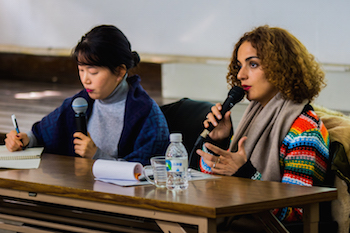
People may think of French as the language of love, but the heroines of the French-Moroccan writer Leila Slimani are often far from romantic. The award-winning author has penned female characters who are often unprivileged, or live outside of social norms. Slimani herself was very sweet when she spoke to students during a special lecture held by Lucete Humanities Project on Nov. 15 at Ewha.
The writer mentioned that most of her female characters, while complex and at times distraught, are inspired by the women she sees around her.
“I would sit on Place de la Concorde, a square in France, to examine different types of women in reality,” she told the audience.
Born in Morocco but brought up in France, Slimani enjoyed writing from a young age.She won the Prix Goncourt award with her second novel Chanson douce, known as Lullaby in English. However, the writer said it had taken her a while to become a novelist.
She first tried out various careers. She was an actress in small plays, but felt she could not take on the roles as her own. She also worked as a journalist, reporting from African countries.
“Writing articles and contemplating how to compose the lead in order to catch my readers’ attention greatly influenced my writing style as an author,” Slimani said. “However, I had to quit journalism when I got pregnant, as my job required traveling to dangerous places.”
She then began a two-year plan to become an author, vowing to commit herself fully until she achieved her goal. However, she could not find a publisher for her first novel, about a revolution on the Arabian Peninsula.
“After getting rejected, I abandoned all my work from the first year of my two-year plan,” Slimani remarked. “It is crucial to always keep in mind the importance of taking a break from your work as much as coming up with new subjects you wish to write about.”
Her subsequent novels all focus on female protagonists, usually not very likeable people. Slimani noted that she wanted to leave room for her readers to understand her characters without judging them.
“I have several topics that I convey through my books - the capacity of a working mother, dilemmas they face in loneliness felt by redefining their motherhood,” she said.
The creation of fictional identities is a quest to transcend her own, which is marked by various divisions ranging from culture and gender to nationality and ethnicity.
“It is true that having a national identity in two different countries with different cultures often makes me feel like an alien in both,” she said. “But, at least when writing books, I exist merely as a single individual, completely losing myself in terms of national, social or gender identities.”
The author has now embarked on a nationalist role. Slimani was appointed to promote French language and culture by the President of France on Nov. 6.
“I would like to spread the image of French as a more familiar language via films and literature, as many consider it to be rather artistic,” Slimani said.
When it comes to her writing, Slimani plans to remain focused on feminism. “For now, I don’t have plans on focusing on subjects other than women’s rights,” she said.

